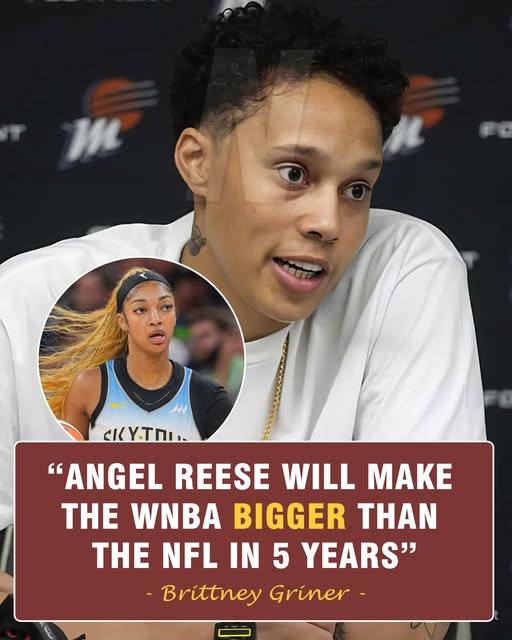Brittney Griner, one of the most recognizable figures in women’s basketball and a three-time Olympic gold medalist, has made a bold prediction that has ignited debates across the sports world. Speaking with conviction about the future of the WNBA, Griner declared that “the W will be bigger than the NFL in 5 years thanks to Angel Reese.”

While the statement is ambitious, it reflects her deep belief in the transformative impact of Angel Reese, a breakout star whose arrival in the league has coincided with a noticeable surge in popularity, media attention, and cultural relevance for women’s basketball. Griner, who has long advocated for the growth of the WNBA and greater respect for female athletes, pointed to Reese’s charisma, skill, and ability to connect with fans as evidence that the league is entering a new era of growth. Angel Reese, known as much for her confidence and presence as for her dominating on-court performances, has quickly become a household name since joining the WNBA. She has generated immense attention not only from basketball fans but also from mainstream audiences who follow her through social media, endorsements, and her outspoken personality.
Reese’s ability to resonate with young athletes and inspire fans has made her one of the most marketable players in the league. Merchandise sales, viewership ratings, and online engagement have all seen boosts that analysts attribute in large part to the “Angel Reese effect.” Her role as both an athlete and a cultural influencer positions her as the kind of star who can help push the WNBA into broader relevance in American sports. Griner’s prediction also highlights the importance of star power in sports leagues.
The NBA’s global growth has often been tied to the emergence of iconic players like Michael Jordan, LeBron James, and Stephen Curry. Similarly, the NFL’s dominance has been built on the popularity of its stars and the spectacle surrounding its events. By suggesting that Reese could serve as a catalyst for the WNBA’s rise, Griner is emphasizing how vital it is for women’s basketball to have players who not only excel on the court but also capture public imagination off it.
“Angel brings a new energy and confidence to the game,” Griner said in a recent interview. “She’s inspiring a whole generation of young athletes and showing that women’s basketball deserves to be in the spotlight.” Her words reflect the optimism of many who see women’s sports as being on the verge of a cultural shift, one that places them closer to parity with their male counterparts. Of course, Griner’s prediction that the WNBA could surpass the NFL in just five years raises eyebrows. The NFL remains the most-watched and lucrative sports league in the United States, generating billions in revenue and dominating television ratings year after year.
Sunday football is deeply ingrained in American culture, and the Super Bowl is the most-watched sporting event in the country. By comparison, the WNBA is still in the process of expanding its audience, negotiating higher player salaries, and gaining consistent mainstream media coverage. Industry experts caution that overtaking the NFL within such a short time frame may not be realistic, but they agree that the trajectory of the WNBA is undeniably upward. Initiatives to expand the league, improve conditions for players, and secure more marketing deals are already paying off.
Partnerships with major broadcasters and sponsors are boosting visibility, and stars like Reese are giving fans a reason to tune in. Furthermore, the broader movement in support of women’s sports has created momentum that is propelling leagues like the WNBA into the spotlight. Increased coverage of college women’s basketball, the success of athletes like Caitlin Clark and Angel Reese, and the cultural conversations around equity in sports are all contributing to a climate in which women’s basketball is gaining serious traction. Griner’s bold prediction has therefore served as a conversation starter about what is possible, pushing fans and analysts to imagine a future where the WNBA commands attention on the same scale as traditionally male-dominated leagues.
For Griner, Reese represents not only the present but also the future—a symbol of what women’s basketball can achieve with the right mix of talent, personality, and opportunity. As the league continues to evolve, the focus will be on how to capitalize on this momentum. Expanding teams, creating a more robust fan experience, and leveraging the visibility of its stars will be critical steps toward reaching the ambitious goals that Griner envisions.
Whether or not the WNBA surpasses the NFL in five years, it is clear that the league is in the midst of a transformation. Angel Reese’s rapid rise to prominence has already begun to change perceptions, and Brittney Griner’s outspoken confidence in her teammate’s impact reflects the optimism coursing through women’s sports today. Even if the prediction remains aspirational, it underscores a reality that cannot be ignored: the WNBA is growing faster than ever, and with stars like Angel Reese at the forefront, its ceiling is higher than many would have believed possible just a few years ago.





